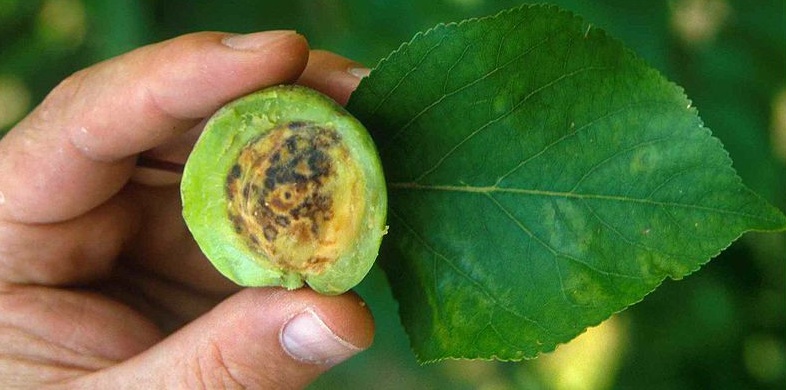
 November 2, 2009 – Ten years have passed
November 2, 2009 – Ten years have passed
since the discovery of Plum Pox Virus (PPV) in Pennsylvania – 10 years of
intensive survey and eradication effort. The state is pleased to report that no
virus has been found in the past three years of survey, fulfilling the
requirements necessary to declare eradication of PPV from Pennsylvania.
November 2, 2009 – Ten years have passed
since the discovery of Plum Pox Virus (PPV) in Pennsylvania – 10 years of
intensive survey and eradication effort. The state is pleased to report that no
virus has been found in the past three years of survey, fulfilling the
requirements necessary to declare eradication of PPV from Pennsylvania.
 |
|
| Symptoms of plum pox in apricots. |
In 2009, joint USDA/PDA
survey in the Commonwealth of Pennsylvania generated a total of 226,534
laboratory (ELISA) samples, with no PPV detections. This is the third year of
all negative PPV data.
Samples collected included
commercial orchard trees (209,841), residential property trees and shrubs
(10,843), nursery and budwood source trees (5,732), sentinel and wild trees
(118). The majority of these samples were collected in a 25-mile radius area
that encompassed every part of the state in which positives had ever been
found, but sampling did extend beyond that area to include commercial orchard
samples from 10 counties as well as samples from PA nursery operations moved to
adjoining states.
In addition to running all
226,534 samples in ELISA, a subset was tested using the more sensitive real
time RT-PCR test. A total of 1,413 samples have been tested using this
protocol, with no positive results.
This survey season marked
the third year of all negative survey data in the Commonwealth. As of October
29, 2009, all PPV quarantine restrictions for commercial orchards and
residential properties within Pennsylvania will have been removed. A limited
nursery quarantine will remain in place during a three-year monitoring phase of
the plum pox program. The nursery quarantine does not affect the sale of Prunus
from retail sites that buy-in their nursery stock, but propagation or long-term
grow-out of Prunus is prohibited. This nursery quarantine provides further
assurance to buyers of Pennsylvania nursery stock that the stock is safe to
plant, that no hidden PPV infection will introduce the virus to new areas
through the movement of infected nursery stock.
Total PA orchard acreage
removed since the beginning of the program stands at 1,614 acres, unchanged
from 2006.
After three years of all
negative survey nationwide (2000-2002), the national survey (outside
Pennsylvania) has focused on higher-risk areas of the country. In 2006, for the
first time, this national survey detected positive trees in states other than
Pennsylvania: three positive trees in New York and one in Michigan. In 2007
through 2009, both Pennsylvania and Michigan have conducted surveys that
yielded all negative data. Positive trees have been found in New York each year
since 2006. No link has been identified between Pennsylvania and the PPV finds
in New York or Michigan.
Print this page